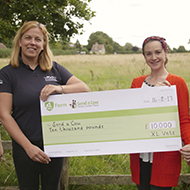Charity provides further training following generous donation

Bryony Kendall presents a cheque to Georgia Smith, Becky Moorcroft and Joanna Brownbill
The 57 independently-owned veterinary practices that comprise XLVets came together for an auction of promises at its AGM earlier this year, raising £20,000, of which Send a Cow has received half. The other half was donated to veterinary mental health charity, Vetlife.
Send a Cow will use the money, in conjunction with XLVets, to help farmers in some of the poorest parts of Africa by up-skilling their local support teams on the ground. The local teams are being trained in livestock management through a bespoke programme, delivered by veterinary surgeons from Farm Skills Africa, XLVets’ charitable initiative.
So far in this three-year project, training has included aspects of practical nutrition, ‘push-pull’ technology (a method of growing crops that repels pests), shed design – including animal health and environment principles, calf management and good stockmanship.
Teaching is delivered via interactive workshops and talks on farms about livestock husbandry. In total, two groups of 12 Send a Cow delegates have taken part in the programme – from Kenya, Rwanda, Uganda and Burundi.
Becky Moorcroft, Send a Cow corporate partnerships manager, said: “We’re thrilled to be working alongside XLVets. Not only are members offering their veterinary expertise, but they’re raising much-needed funds too. It’s a great partnership that is having a real impact on farming families in east Africa.’’
Bryony Kendall, from Farm Skills Africa, who helped develop the programme and deliver the inaugural training sessions in October 2016, added: “XLVets is committed to supporting the great work of Send a Cow and we’re delighted to have raised such a large sum. It joins the £20,000 already raised by the XLVets team, with support from Boehringer Ingelheim.
“We feel that the training is the best way to help these farming communities to become self-sufficient and we’re proud to support them in building a sustainable future.”



 The Veterinary Medicines Directorate (VMD) is inviting applications from veterinary students to attend a one-week extramural studies (EMS) placement in July 2026.
The Veterinary Medicines Directorate (VMD) is inviting applications from veterinary students to attend a one-week extramural studies (EMS) placement in July 2026.